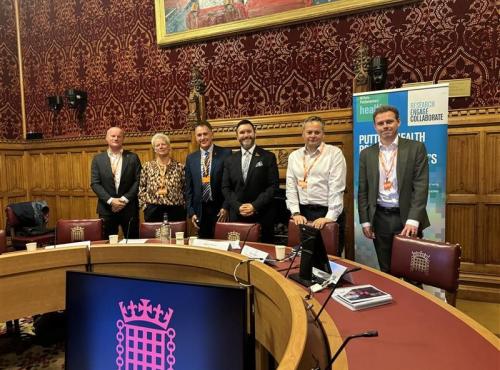Providing better mental health service for all – our Head of Health speaks at a Labour Party Conference Fringe Event
On Monday I was delighted to join the panel at a New Statesman and NHSA event as part of the Labour Party Conference fringe events programme. The discussion focused on regional inequality in mental health from service provision to experience and outcomes for patients. The panel included the Shadow Minister for Mental Health, Dr Rosena Allin-Khan MP, Kim Johnson, MP for Liverpool Riverside and a number of expert speakers including Saffron Cordery (Deputy CEO, NHS Providers) and Mark Rowland (CEO, Mental Health Foundation) delivering clinical care, research or support for patients.
Over the 90-minute event, the panel discussed factors affecting mental health over a liftime, considering everything from housing to education, skills, and employment. Importantly, the discussion focused on prevention and early intervention, specifically reduction of child poverty.
Panellists also considered current barriers that stop people seeking help early. These include cultural factors and stigma surrounding discussing mental health in some communities and industries; a lack of trust in policy makers and services; and absence of local infrastructure to support coming forward.
The conversation also covered challenges in reducing mental health inequality and providing a better service for all. These included growing waiting times, staff burnout and shortages, lack of capacity for patient appointments and poorly integrated services.
The focus of the event however was on solutions. Speakers covered examples at a local and national level from cultural changes, such as discussing mental health more widely, to large-scale poverty reduction measures such as investment in education, transport, infrastructure, and welfare.
The importance of research and development was highlighted as an important step in ensuring progress is made, in particular, clinician led research that is collaborative and coproduced with communities and service users. Including service users in every stage from very start creates interventions that work on a local level and provides a platform to scale up solutions and involve the people affected by policy at a national level.
It was great to be able to engage with the Labour Party and shadow cabinet on this issue and to be able to discuss the work that Policy Connect is currently undertaking as co-investigators with Manchester Metropolitan University. This work is using coproduction to examine black men’s experiences with the Mental Health Act. Experts by experience are key to the success of this project at all levels and it is particularly important that policy reflects this. We hope that this roundtable discussion is the first of many with parliamentarians, academia and third sector to create the kind of change that will impact on inequality in access, experience and outcomes across mental health.




